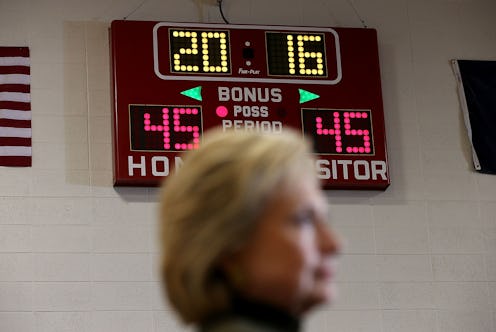News
Hillary Clinton Didn't Do So Well In Kentucky
In the two-state contest held on May 17, the two remaining Democratic candidates competed against one another in the ever-important race to secure as many delegates as possible. Bernie Sanders has had trouble winning these delegates in past primaries, but how many delegates did Hillary Clinton win in Kentucky? The same number as her opponent, Sen. Sanders, actually.
The polls closed at 8 p.m. in Kentucky after it's primary, but results weren't updated until hours after they closed. Although Clinton declared victory in the Bluegrass State, she only finished with a 0.5 percent lead over Sanders. That's right — Clinton received 46.8 percent of the votes, while Sanders earned 46.3 percent. And because the delegates were allotted proportionally in Kentucky, Clinton and Sanders finished with the same number of delegates: 27.
There were 55 delegates up for grabs at this primary. It seems as though one delegate will be left out of the allocation process, as both candidates had an equal number of delegates after 99 percent of the votes were reported. Perhaps this is because of the logistics of the proportional allocation. At any rate, Clinton didn't do so well in Kentucky (even if she claimed a victory) because she effectively tied with Sanders.
And things went even worse for Clinton in Oregon, where she took second place to Sanders in the state's primary on May 17. Clinton earned at least 24 delegates in the Oregon primary, which is a commendable portion of the total 61 delegates available in this contest. However, she lost to Sanders by nearly 10 percentage points, which wasn't great for her campaign.
The state had only reported 73 percent of its votes more than eight hours after the Oregon polls closed. This means that Clinton could actually earn a few more delegates in Oregon, putting her closer to Sanders' at least 28 delegates earned in the Beaver State. Sanders was clearly happy about his win in Oregon, posting a victorious tweet for his 2.21 million followers:
But even though Clinton didn't perform well in the Kentucky primary, especially with delegates, the loss likely won't really affect her campaign too much. Going into this primary, Clinton had a sizable lead over Sanders in total delegate count: 2,291 delegates and 1,528 delegates, respectively. The eventual Democratic Party nominee needs 2,383 delegates to become the official representative for the party in the general election; Clinton is only 92 delegates behind, but Sanders is 855 delegates short.
Perhaps Sanders considered it a win to tie Clinton in earned number of delegates at the Kentucky primary; Clinton might have even considered her performance a loss behind closed doors. But just because she tied Sanders in delegates in Kentucky doesn't mean her campaign is slowing down any time soon. The Democratic frontrunner has many more primaries to snag the remaining 92 delegates she needs to become the party's nominee ahead of the Democratic National Convention in July.
